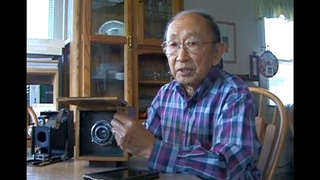Interviews
Camp as a positive thing
Everything in camp could be a positive thing. Every person you meet, you know, that you never met before or you hear what town they came from, or if they were farmers or fisherman or what, you know. I mean, to me I didn’t think of that experience as being such a negative thing. I thought, everybody goes through changes through life—after all, look at what our parents, they left their home country and came here. And here, we just went from our hometown to this camp that I didn’t think… and I had told all the Sunday school kids, “Your life hasn’t even begun yet. You don’t even know what you’re gonna go through five years from now, ten years from now, twenty years from now…” And so, I mean, I thought it’s good to prepare them that this isn’t the worst thing that could happen. And then, of course, afterward when I learned about slavery and the way blacks were treated, I thought to myself, “My God! I mean, how can we complain where others have been treated so much worse…”
Date: June 16, 2003
Location: California, US
Interviewer: Karen Ishizuka, Akira Boch
Contributed by: Watase Media Arts Center, Japanese American National Museum.









